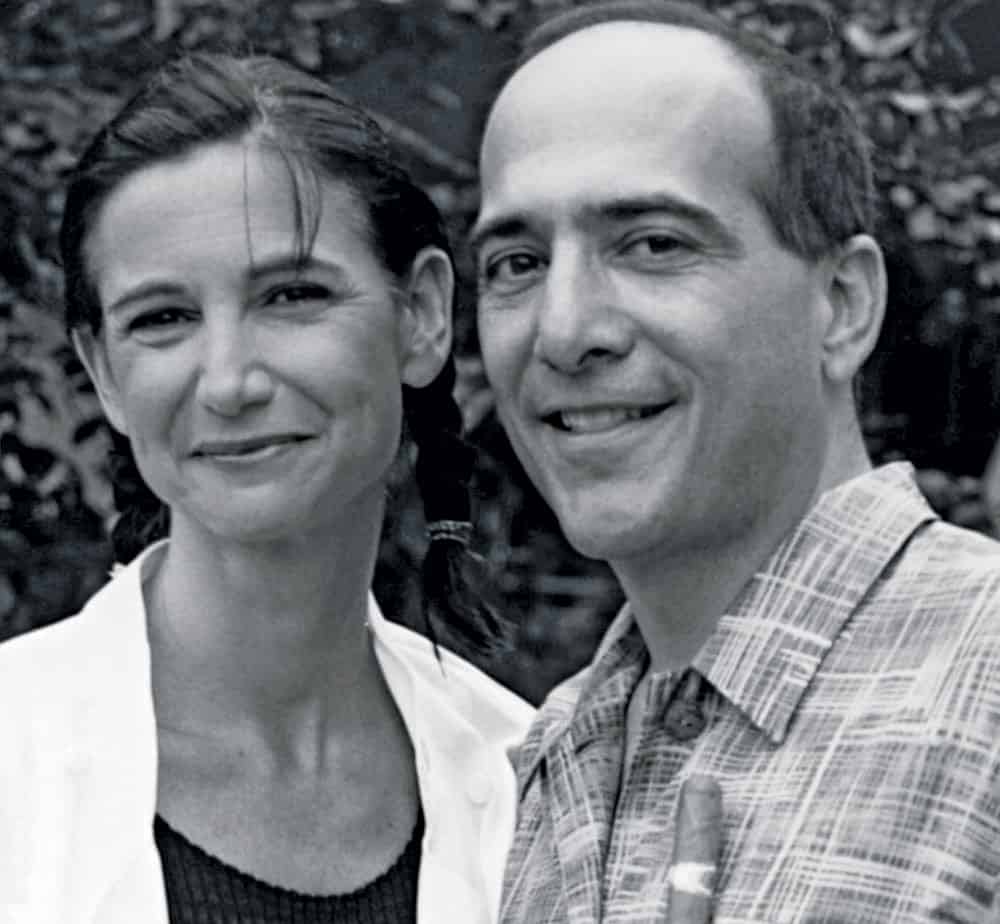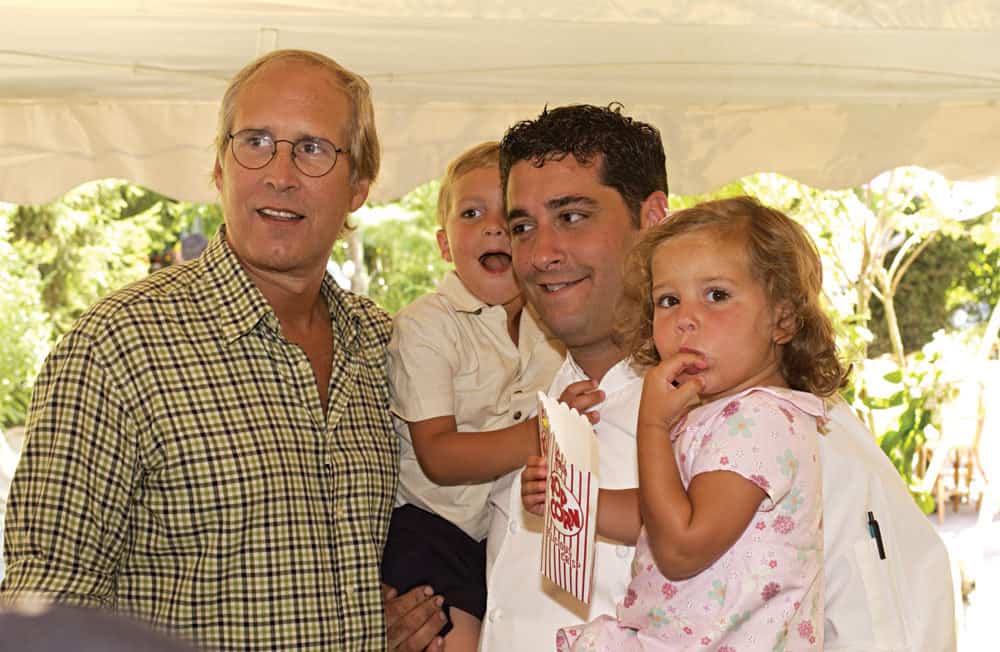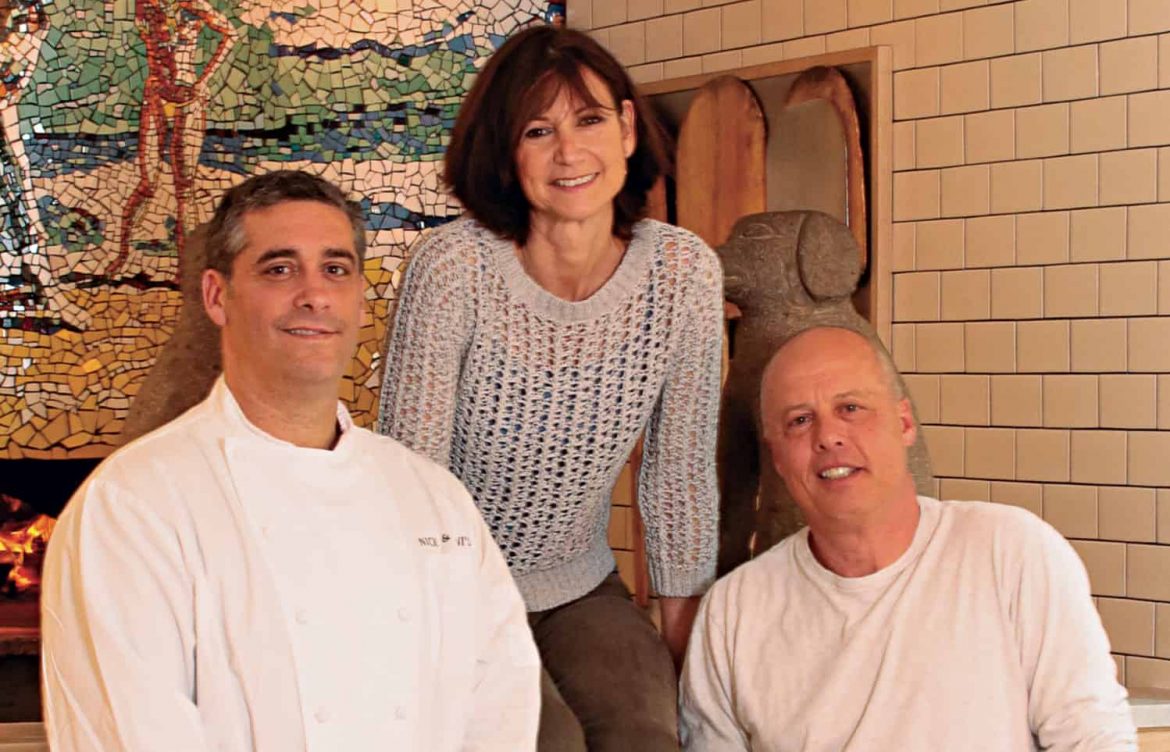What began as a tiny spot in East Hampton in 1988 has become an international destination and a pioneer in the country’s farm-to-table movement. On the occasion of Nick & Toni’s 30th anniversary, let’s see how it all happened!
Toni, take us back to August 3, 1988 — the opening night of Nick & Toni’s.
TONI ROSS: Jeff and I figured that it was the beginning and the end, all in one night. We never announced we were actually opening because it was August, and we thought the fewer customers, the better. The first person in the door was Craig Claiborne, who was the retired New York Times food critic — an extraordinary man. He showed himself to his own table because he used to like that table when it was the previous restaurant. He was so wonderful, and he kept coming back with friends and giving us really helpful critiques — not just about food, but about service and all kinds of things.
What did you serve?
Ross: Beet ravioli, quail with cherries and Vin Santo, Caesar salad, the chicken, the penne — all are still on the menu — and the zucchini chips. If we took those off? Major mutiny. We also had calf’s liver and onions. I can’t remember if we had risotto.
MARK SMITH: I think there was a risotto. It seems like there’s always been a risotto.
Ross: We didn’t have tiramisu because I was really bad at making it. It’s just this weird thing. I’m a decent pastry person, but I like really simple things, but somehow tiramisu had eluded me. We had a flourless chocolate cake that was incredibly good, and lots of fruit. And a center table with grappa and biscotti, and Vin Santo, until we realized people would walk by and stick some in their bag.

Toni Ross and Jeff Salaway
What was your concept for the restaurant?
Ross: Jeff [Salaway] and I met in Italy. We spent quite a bit of time there, and we discovered a lot of Italian food that wasn’t being served in the United States — things like beet ravioli with poppy-seed sauce or tagliatelle with lemon, olive oil with bread. We wanted to present that, but what it really meant was that we loved Italy, and we wanted to serve food that was meaningful, fresh, and really direct and simple. That has never changed. We’ve morphed away from being strictly Italian, because neither of us is actually Italian. It was more important to have really fresh, clean foods. Jeff was also dedicated to the locavore movement — although it didn’t have a name then — and developing relationships with local farmers and fishermen.
For how long did you make the pastries?
Ross: For about three years, until I stopped working here when I was pregnant with my daughter because my back was really bad. I had always planned on getting back to my artwork. When I was pregnant, I was repulsed by the smell of sugar, so it made baking very challenging. My favorite thing to eat was plain yogurt. I was like, “Here, Jeff, have some of this — it’s so delicious!” He said, ”I’m good!” [Laughs]
Mark, how did you get involved?
Smith: My family bought a place in Montauk about 40 years ago. I always loved it out here, and through a series of life circumstances, I started my career in the hosiery business. We eventually sold the company. I had always wanted to live out here, I said, “If not now, then when?” I thought I wanted to be a chef, so I went to Peter Kump’s Cooking School, and realized I was probably a little old to jump behind the lines. Having had years of experience in running businesses, I decided I was better suited for front of the house. I started working at a friend’s restaurant in the city, and while I was there, I met somebody who was friendly with Jeff [Salaway], aka Nick from Nick and Toni’s. I got an interview. A typical Jeff-fashion interview was, “Yeah, if you want to get involved in this business, no problem.” So I started here as an assistant manager twentysomething years ago. I told him from the beginning that my goal was to own my own place. We struck up a friendship and a business relationship. Jeff was the consummate host — big ideas, great concepts, and great food. I was used to running a business. He hated running the business. It was a really good partnership. When a space became available, we’d been working together for about six months, Jeff said, “Listen, how do you feel about doing something together?” I was like, “Great!” We did Rowdy Hall, and became partners in everything.
Ross: There’s still a “family feeling“ here about the ways that it’s run. It always felt like a high-end mom-and-pop place, because we were here 24/7. Many of the people who began working for us, like Bonnie [Cashin], Joe [Realmuto], and Mark, have been here almost its whole history.

Jeff Dell, Carol and Lloyd Friedland, Paul and Bonnie Cohen, Bunny Dell, and Chef Joe with friends on New Year’s Eve circa 1993.
Nick & Toni’s is known for its lengthy relationships with East End farmers and fishermen.
Smith: Amber Waves, Braun Seafood, Stewart’s, Gosman’s, Scott Chaskey at Quail Hill Farms…Scott was a big influence and helped us start our own garden. He’s such a generous soul.
Ross: I had met Scott years before at the invitation of Elaine de Kooning, who was mentoring me and my artwork. She was an incredible portraitist. I had the opportunity to be next to her while she was making portraits, and Scott was somebody that she painted quite often. It was like I was in my own private graduate school. Scott was a poet, and he and Megan had been living in Scotland to farm, and then moved back here. They’re pioneering types. The community was obviously based on farming and fishing all the way back, but, through the series of economic changes, people sold their land, stopped farming. Scott was really the one, in my memory, who sort of brought people back to the roots of the community in terms of farming. I think he’s the impetus for everything that’s going on here today.
According to a 2013 New York Times story, Bonnie was slated to retire.
Ross: Her idea of retiring was cutting back! She still works Fridays and Saturdays. The New York Times named Bonnie the most important person in the Hamptons. My mom used to call Bonnie for reservations, not me. She’s not running the show, per se—we have a general manager, Julie [Berger], who started with us when she was 13 years old. We knew Bonnie in the city: She was working for Larry Forgione, and there was a tight-knit group of Jonathan Waxman, Larry, and some others who would get together. When we came out here, she came to us pretty early. A few waiters we worked with in the city also came out.
When did you expand the restaurant?
Ross: About five years after we opened. That actually changed everything. There was something about a real bar, a wood-burning fireplace, and the feeling of the room that created a different environment. We opened the addition by the seat of our pants. I made the light fixtures out of shirt-collar lining and copper tubing. We opened the porch and took away the bocce court. That was a major change. It felt more grown-up.
One of the things I love about the restaurant is that when you walk in, you get a Cheers vibe — even if you’re in from out of town.
Smith: Yes, and your impression is probably pretty universal. A lot of people who come here for the first time have an impression that you have to be a celebrity, but it’s much more of a convivial, casual, unpretentious place.
Ross: Jeff was pretty prescient about wanting to have great food and not all the other stuff that went along with what people imagined [in a fine dining experience]. We’re out at the beach — we wanted the restaurant to feel comfortable and easy. From day one, that’s been part of it. Also, Jeff loved hosting. Mark, and Christie [Cober], and Joe, and Bonnie have really dedicated themselves to continuing to make the restaurant feel that welcoming, and it’s part of their DNA.
What is family meal like?
Smith: It can be anything from hot dogs to tacos to stew. I use it as a way to check out cooks, because it really gives us insight into how they prepare things.
Thoughts on the summer craze?
Ross: It’s bizarre, but the busier we are, the more on top of everything we are. In the summer, [customers] get the best service, food, the best everything.
Which tables are the most coveted?
Ross: I don’t think we should say!
Smith: If you like to look at others and be seen by them, you’re probably in the front room. If you’d like to enjoy the company of your friends, your favorite tables would be in the back. There’s definitely a little bit more buzz outside. When people write about us, they do write about the front room.
Ross: But it’s partly because Steven [Spielberg] had always loved that one seat, so that became kind of a thing, but then he moved inside, so then that became a thing.

Chevy Chase and Joe Realmuto with his son Jonathan and daughter Nicole at the Nick and Toni’s 15 year anniversary.
A lot of crazy things have happened at the restaurant over the years…
Smith: Remember when someone stole our stone dogs in the middle of service over Memorial Day weekend?
Ross: Those were the first pieces Jeff and I had collected together, which is why we made them a part of our logo.
Smith: They weighed 150 pounds each — maybe 200! They turned up in New York City, so we got them back.
Ross: Ina Garten and I used to trade crazy customer stories — Ina almost always won — and it was kind of fun. Were you here the night Chevy [Chase] decided he was going to answer the phones and seat people?
Smith: I might’ve been. Didn’t Barbara Streisand come, we were closed, and Joe still cooked for her?
Ross: Remember the guy shaving at the table with an electric razor?
Smith: Guess he felt he needed to shave.
Ross: And there was the guy at Townline [BBQ]…
Smith: Oh, doing body work on his car in the parking lot? Had two guys using an electric grinder to sand paint off his car. He comes up to Joe and says, “It’s okay. I’m having lunch here!” [Laughs]
Where do you ultimately want to take the business?
Smith: It’s my goal to build an organization that’s not dependent on any single person. When Jeff died [in 2001], it was a scary time. A lot of people who worked here said, “What’s going to happen? Will I still have a job?”
Ross: “And if the restaurant continues, how is it going to happen without Jeff?” I definitely was MIA for a while.
Smith: We’re going to continue to grow our business in some form. We started a catering company a few years ago, which is doing well, and we’ve talked about branding our products.
Ross: Part of our success has been the ability to move with the times. Sometimes, we anticipate the times. You can’t stay where you were, but that being said, you also don’t want to lose what you are.
Smith: In today’s environment, if you’re not moving forward, you’re moving backward. Just the microcosm of the Hamptons as a restaurant scene has changed drastically in 30 years. For the better, because there are a lot more good places to eat. I always enjoy the competition. It makes us all better.
Subscribe to our newsletter and follow us on Facebook to stay up to date on all the latest fashion news and juicy industry gossip.

